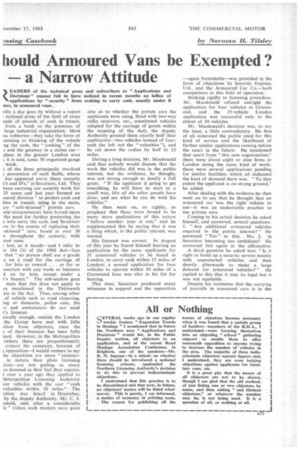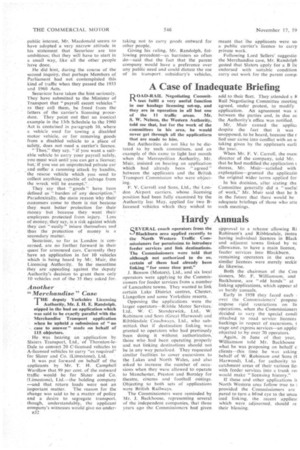?nsing Casebook by Norman H. Titsley
Page 65

Page 66

If you've noticed an error in this article please click here to report it so we can fix it.
hould Armoured Vans be Exempted?
--a Narrow Attitude
EADERS of the technical press and subscribers to "Applications and
Decisions" cannot fail to have noticed in recent months an influx of 'k-applications by " security " firms seeking to carry cash, usually under 13 ,nce, in armoured vans.,
rdly a day goes by without a report : national press of the theft of some ands of pounds of cash in transit, from a bank to the premises of large industrial organization. Most !se robberies—they take the form of irnming or blocking of the vehicle ng the cash, the " coshing " of the s and the getaway in a stolen car— place in the greater London area it is said, some 30 organized gangs : work.
e of the firms principally involved e prevention of such thefts, whose
has appeared many times recently Vs and D's," is Securicor, Ltd, They been carrying out security work for 25 years and last year formed an oured division" to protect cash and bles in transit, using in the main, iry "soft-skinned " private cars. ;ent circumstances have forced upon the need for further protecting the e who carry the cash, and Securicor DW in the course of replacing their -skinned" cars, based at over 30 :s throughout the country, with ired vans.
! law, as it stands—and 1 refer to .n 164 (1) of the 1960 Act—lays that "no person shall use a goods c on a road for the carriage of for hire or reward . . or for or mection with any trade or business d on by him, except under a r's licence." The sub-section goes state that this does not apply to es mentioned in the Thirteenth uIe to the Act. Thus, among other
of vehicle such as road cleansing, jog or dustcarts, police cars, fire ss and ambulances do not need r's licences.
nically enough, outside the London the Group have met with little Rion from objectors, once the e of their business has been fully ined. However, in the Metropolitan (where there are proportionately crimes) the company, because of ; opposition-1 would venture to say .he objections are more "comma
in nature than plain licensing :ions—are not getting as many es licensed as they feel they require.
t over a year ago they applied to Metropolitan Licensing Authority our vehicles with the user "cash valuables within 50 miles." The !ation was heard in December, by the deputy Authority, Mr. C. J. onald, and, after a considerable le" (when such matters were gone
into as to whether the private cars the applicants were using, fitted with two-way radio receivers, etc., constituted vehicles adapted for the carriage of goods within the meaning of the Act), the deputy Authority granted them exactly half their application—two vehicles instead of four; cash (he left out the "valuables "), and he cut down the radius by half to 25 miles.
During a long decision, Mr. Macdonald said that nobody would dispute that the work the vehicles did was in the. public interest, but the evidence, he thought, was not strong enough to justify a full grant. "If the applicant is going to get something, he will have to start in a small way, like all the other people have done, and see what he can do with his vehicles."
He then went on, so rightly, to prophesy that there were bound to be many more applications of this nature "before another year is out," and he supplemented this by saying that it was a thing which, in the public interest, was -wanted.
His forecast was correct. In August of this year he found himself hearing an application by the same applicants for 35 armoured vehicles to be based in London, to carry cash within 25 miles of London; a second application for four vehicles to operate within 50 miles of a Gravesend base was also in his list for hearing.
This time, Securicor produced many witnesses in support and the opposition —again formidable—was provided in the form of objections by Security Express, Ltd., and the Armoured Car Co.—both competitors in this field of operation,
Sticking rigidly to licensing procedure, Mr. Macdonald refused outright the application for four vehicles at Gravesend, and the 35-vehicle London application was successful only to the extent of 10 vehicles.
Mr. Maedonald's decision was, to say the least, a little contradictory. He first of all reiterated the public need for this kind of service and the likelihood of further similar applications coming before the court in the future. He Mentioned that apart from "this new organization," there were about eight or nine firms in London doing the same kind of work; there were several applications pending for similar facilities, which all indicated the kind of demand there was, "To that extent the applicant is on strong ground," he added.
After dealing with the evidence_he then went on to say that he thought that an armoured car was the right vehicle to use—it was an undesirable practice to use private cars.
Coming to his actual decision he asked himself, and answered, several questions: 1. "Are additional armoured vehicles required in the public interest? " I4e answered "Yes" to this. No. 2. Is Securicor becoming too ambitious? He answered this again in the affirmative.
A third question he asked was: "Is it right to build up a security service mainly with unprotected vehicles and then shortly afterwards to make a large demand for armoured vehicles? " He replied to this that it may be legal but it was not equitable.
Despite his insistence that the carrying of payrolls in armoured cars is in the public interest, Mr. Macdonald seems to have adopted a very narrow attitude in his statement that Securicor are too ambitious; that they will have to start in a small way, like all the other people have done.
He did hint, during the course of the second inquiry, that perhaps Members of Parliament had not contemplated this kind of traffic when they passed the 1933 and 1960 Acts.
Securicor have taken the hint seriously. They have submitted to the Minister of Transport that "payroll escort vehicles" as they call them, be freed from the fetters of the. carrier's licensing procedure. They point out that an ironical example in the 13th Schedule to the 1960 Act is contained in paragraph 10, where vehic!e used for towing a disabled motor vehicle, or for removing goods from a disabled vehicle to a place of safety, does not need a. carrier's licence, "Thus," they say, 'if you want a suitable vehicle to carry your payroll safely, you must wait until you can get a licence; but, if you use an unprotected private ear and suffer a ramming attack by bandits, the rescue vehicle which you send to collect anything capable of salvage from the wreck will be exempt"
They -say that " goods " have been defined as "-burden of any description." ParadoxiCally, the main reason Why their customers come to them is riot because they want. better protection for their money but . because they wanttheir employees protected from injury. Loss of money, theysay, is a riSk against which they can "easily-" iniure themselves and thus the protection of money is a secondary m atter.
Securicor, so far as 'London is concerned, are no further forward in their quest for armoured cars. Currently they have an application in for 10 vehicles which is being beard by Mr. Muir, the Licensing Authority. In the meantime they areappealing against the deputy Authority's decision to grant them only 10 vehicles out of the 35 they asked for.
Another "Merchandise" Case
THE deputy Yorkshire Licensing Authority, Mr. J. H. E. Randolph, nipped in the bud an application which was said to be exactly parallel with the Merchandise Transport application when he upheld a submission of "no . case" to answer" made on behalf of 115 objectors.
He was hearing an application by Slaters Transport, Ltd., of Thornton-leDale to convert 20 C-licensed vehicles to A-licensed vehicles to carry "as required" for Slater and Co. (Limestone), Ltd.
It was put forward on behalf of the applicants by Mr. T. H. Campbell Wardlaw that 99 per cent. of the outward traffic would be for Slater and Co. (Limestone), Ltd.—the holding company —and that return loads were not an important matter. The reason for the change was said to be a matter of policy and a desire to segregate transport, though, understandably, the applicant company's witnesses would give no under a32 taking not to carry goods outward for other people.
Giving his ruling, Mr. Randolph, following precedent—as barristers so often do—said that the fact that the parent company would have a preference over any public need and could dictate the use of its transport subsidiary's vehicles, meant that the applicants were se' a public carrier's licence to carry private work.
Following Lord Sellers' suggestio the Merchandise case, Mr. Randolph gested that Slaters apply for a B lic endorsed with suitable condition carry out work for the parent coinp,




















































































































